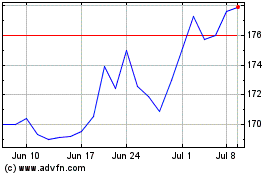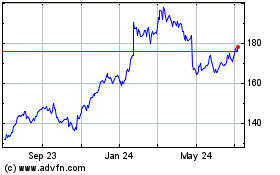IBM to reveal new line of microprocessors as AMD touts its Zen
processor technology
By Don Clark
Few companies enjoy the kind of dominance Intel Corp. does in
chips for the computers found in data centers. But competitors keep
trying to pry open its server stronghold, with International
Business Machines Corp. the latest to brandish a new tool.
IBM, at a Silicon Valley technical conference on Tuesday, plans
to reveal new details of Power9, the next addition to the line of
microprocessors the technology giant uses in its own servers and --
in a recent strategy shift -- offers to other hardware
companies.
Advanced Micro Devices Inc., meanwhile, is using the same event
to discuss the inner workings of processor technology called Zen
that it plans to use in chips targeting servers and other hardware.
AMD, which uses the same x86 design as Intel, last week at a
company event demonstrated a chip using Zen processor cores
outpacing its larger rival's chips in one speed test.
"We had let our performance slip versus the competition," said
Mark Papermaster, AMD's senior vice president and chief technology
officer. "This really is quite a statement to the industry that AMD
is back in high-performance processors."
ARM Holdings PLC, which licenses chip technology used in most
mobile phones, is also discussing plans at the Hot Chips conference
to add features for use in supercomputers and other scientific
applications. The British company estimates that 13 companies
already are using its technology in chips for servers and other
data-center hardware, which are expected to compete with Intel
products.
Of 9.81 million servers shipped last year, x86 chips were used
in 9.6 million of them -- a 98% share, International Data Corp.
estimates. Intel in the second quarter accounted for 99.7% of x86
server-chip shipments to just 0.3% for AMD, according to Mercury
Research.
Server chips command much higher prices and profit margins than
Intel's other products. The company's data center group in 2015
posted $7.8 billion in operating profit on revenue of nearly $16
billion -- a margin of 49%, compared with just under 30% for the
unit that sells chips for PCs.
"There is an awful lot of margin going to Intel," said Matthew
Eastwood, an IDC analyst. "Customers want alternate suppliers."
That is particularly true of large Web services such as Google
Inc. and Facebook Inc., major Intel customers that nonetheless have
encouraged other suppliers. Google, for instance, was one of the
original members of OpenPower.org, a group IBM helped establish in
2013 to promote use of its chip technology by other companies.
Big Blue hopes to accelerate that push with Power9, which comes
in two basic designs. One chip, with 24 processor cores, is
targeted for Web-type companies that break up jobs to be handled by
hundreds or thousands of machines. Another, with 12 cores, is aimed
at larger systems designed for running applications like corporate
databases.
IBM and others are partly motivated by the increasing popularity
of deep learning, a trend helping to fuel sales of servers and
server chips lately. The technique, a branch of a broader field
called artificial intelligence, allows computers to handle tasks
such as recognizing faces and speech by analyzing vast troves of
data rather than explicitly programming them to do so.
The Power9 chips, expected to begin arriving in the second half
of 2017, have communication links that are especially designed to
exchange data with graphics processing units sold by Nvidia Corp.
That company's chips are now used mainly with Intel processors for
deep-learning applications.
"The hot space is on these workloads," said Brad McCredie, chief
technology officer for IBM's Power line who also holds the title of
fellow.
The point hasn't been lost on Intel, which has moved to add
technology to satisfy server buyers. It paid $16.7 billion last
year for Altera Corp., whose programmable chips can be used
alongside Intel processors to accelerate particular computing
chores.
Intel earlier this month purchased Nervana Systems Inc., a
startup making artificial-intelligence chips and software. It also
used an annual developer conference last week to discuss plans to
use an existing chip line called Xeon Phi for deep-learning
applications.
"We take all competition very seriously," said an Intel
spokesman on Monday.
AMD expects to deliver a 32-core server chip based on its Zen
technology in the second quarter of 2017. Lisa Su, its chief
executive, estimated the company had spent nearly four years and
hundreds of millions of dollars on the development effort.
Analysts said the company still has to prove the final product
can perform in the field as well as in tests, but initial results
seem promising.
"They don't have to be faster than Intel," said Linley Gwennap,
an analyst with the Linley Group. "They just have to be close
enough so they can compete on price."
Write to Don Clark at Don.Clark@wsj.com
(END) Dow Jones Newswires
August 24, 2016 02:49 ET (06:49 GMT)
Copyright (c) 2016 Dow Jones & Company, Inc.
International Business M... (NYSE:IBM)
Historical Stock Chart
From Mar 2024 to Apr 2024

International Business M... (NYSE:IBM)
Historical Stock Chart
From Apr 2023 to Apr 2024
